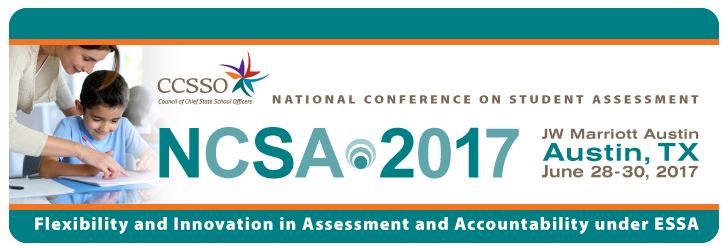 The 2017 National Conference on Student Assessment (NCSA) is the premiere forum for assessment practitioners to discuss what is happening in the real world of educational assessment—what is new, what is going on at the state and federal level, what works, and what does not. This year, the NCSA meeting will be held in Austin, TX on June 28-30, and NCEO staff members will participate in several sessions, namely:
The 2017 National Conference on Student Assessment (NCSA) is the premiere forum for assessment practitioners to discuss what is happening in the real world of educational assessment—what is new, what is going on at the state and federal level, what works, and what does not. This year, the NCSA meeting will be held in Austin, TX on June 28-30, and NCEO staff members will participate in several sessions, namely:
Monitoring Accessibility and Accommodations Across the Comprehensive Assessment System. Sheryl Lazarus & Andrew Hinkle, Presenters; Sandra Warren, Discussant (Wednesday, June 28, 2017: 4:00 PM-5:00 PM)
This session provides an overview of federal requirements for monitoring accommodations, and describes promising practices for monitoring both accessibility features and accommodations. It will focus on best practices for monitoring that emphasize improving outcomes for all students, including students with disabilities, English learners (ELs), and ELs with disabilities; and will include suggestions for monitoring accessibility and accommodations (including about general and alternate assessments) across the range of assessments in a comprehensive assessment system. A state will provide examples of its monitoring activities. This session will not only discuss what works well, but will also delve into the challenges of monitoring. The discussant will pull it all together, and lead a lively discussion about the opportunities and issues.
—
ELPA21’s Approach to Assessing Students Who Are Blind or Have Low Vision. Brooke David & Nancy Rowch, Presenters; Martha Thurlow, Moderator. (Thursday, June 29, 2017: 12:30 PM-1:15 PM)
ELPA21 has developed an innovative test form to support students who are blind or have low vision, and this innovative test requires innovative scoring. This test surpasses traditional practices for adapting online or paper assessments to braille delivery—it relies not only on braille, but also on a high level of interaction between the student and test administrator and uses real-world objects (manipulatives) a student is likely to encounter in a school-based setting. Since these items are unique to these tests, a one-to-one comparison of student performance across testing modes is challenging. In this session, ELPA21 will describe the adaptations used to make the summative assessment more fully accessible to students who are visually impaired. We will also describe the cut score evaluation panels and linking study we conducted to apply cut scores from the online tests.
